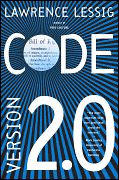 As you can see from my recent post about summer reading, I've been spending a good deal of time these past few weeks getting caught up on all sorts of good books. One that didn't make it onto the previous list, which I just finished, is Lawrence Lessig's Code v2.0 (Basic Books, 2006). Like Kittler's Discourse Networks, 1800/1900, it's one of those books I should have read ages ago (in its original edition [1999]) but never quite managed to. It's smart, accessible, and, honestly, something that everybody living at the dawn of the 21st century ought to read.
As you can see from my recent post about summer reading, I've been spending a good deal of time these past few weeks getting caught up on all sorts of good books. One that didn't make it onto the previous list, which I just finished, is Lawrence Lessig's Code v2.0 (Basic Books, 2006). Like Kittler's Discourse Networks, 1800/1900, it's one of those books I should have read ages ago (in its original edition [1999]) but never quite managed to. It's smart, accessible, and, honestly, something that everybody living at the dawn of the 21st century ought to read.The book, in a nutshell, is about two types of "code": what Lessig calls "East Coast code," or law, and "West Coast code," or the algorithms that make computers and other digital technologies work. There's too much depth and subtlety for me to do justice to the argument, but suffice it to say that Lessig's interested in the ways in which both types of code are (or can be) used to regulate digital environments. He seems most anxious about the increasing use of "West Coast code," since it tends to be private/proprietary and therefore exists significantly outside of democratic process. (And here, there's an obvious resonance with my own rants about digital rights management [DRM] technology.)
It occurred to me in reading Code v2.0 just how ill-equipped the American citizenry (myself included) is when it comes to living in the world Lessig describes. I gather that the vast majority of computer classes taught these days are geared toward basic "computer literacy." This I take to mean general instruction in how to run major commercial applications such as Word, Excel, PowerPoint, and others. More advanced training in actual programming tends to occur in the realm of post-secondary education, and only then with a small, largely self-selected group.
Now, don't get me wrong. I don't think learning how to run major commercial applications is a problem per se. What is a problem, though, is that most of us knows next to nothing about what goes on "behind" the windows we see. Really, these windows are also screens, because they hide at least as much as they reveal. Put differently, most of us at best have only a basic working knowledge of West Coast code. And given all the ways in which, as Lessig shows, this type of code is coming to regulate our lives--quietly in the background, as it were--we need to know much, much more about how it works, and about how to manipulate it, in order to become a better informed citizenry.
I'm not saying that all we need to do is to become computer programmers in order to be better citizens. I don't buy the "netizen" argument, and I haven't fallen under the spell of The Matrix trilogy that much. I am saying that computer programming ought to be a primary subject taught in our schools, just like math, science, foreign languages, and social studies. It's not just a practical skill anymore. Increasingly, it's a matter of civic responsibility.
No comments:
Post a Comment